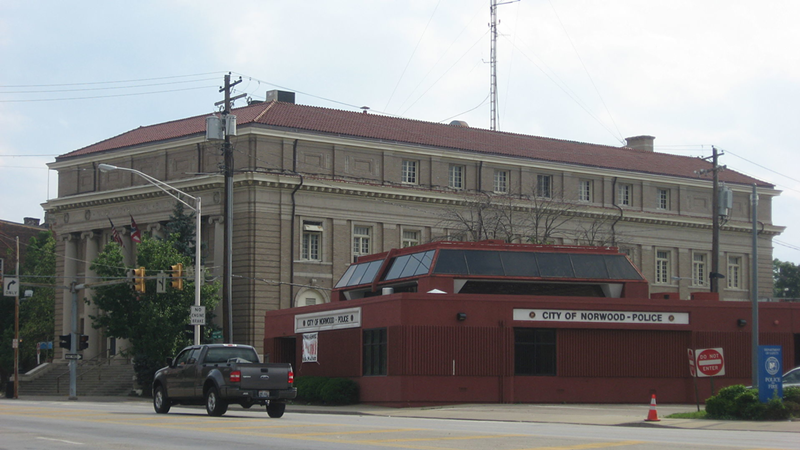Here's a roundup of important news stories that happened around Cincinnati this week.
Cincinnati City Council had a busy week. Here’s what they did:
• In a unanimous vote, council made City Manager Patrick Duhaney’s nomination by Mayor John Cranley official. Duhaney had served eight months as acting city manager after the tumultuous departure of former City Manager Harry Black this spring.
• Council voted 5-3 to approve an ordinance introduced by Councilwoman Tamaya Dennard raising the smoking age in the city limits from 18 to 21.You can read our story about that here.
• Help could be on the way for Cincinnati's affordable housing woes: Council also passed an ordinance by Councilman David Mann creating a fund to preserve and create new affordable housing in the city. But, as you’ll read in our story, where the money to fill that fund will come from is still up in the air.
• Those who attend a senior center on Race Street in Over-the-Rhine can rest a little easier knowing that the facility looks likely to stay — at least for a while longer. Council voted to provide $50,000 toward keeping the OTR Senior Services Center open. That money will go a long way toward the center’s $100,000 budget deficit.
• In other City Hall news, Councilman Greg Landsman sent a letter yesterday asking the Environmental Protection Agency to begin work modeling air pollution around Winton Terrace, one of Cincinnati’s largest public housing complexes. Landsman says that the 3,400 residents of the neighborhood, which sits near multiple industrial sites, have been exposed to more toxic emissions than any other location in the city. Residents at the isolated complex advocate for themselves on a number of issues — now it looks like they make get some backup from City Hall on this one.
• It's here at last: A council committee got its first glimpse of a downtown traffic study that is supposed to boost performance for the streetcar and Metro buses. Council's verdict: meh. You can read our story here about why council members and others have been underwhelmed by the interim report they saw this week.
• Last bit related to city politics: For at least a couple years now, support has been growing for changes to the way the City of Cincinnati decides who gets valuable tax abatements and other public help for private development. Lately, even some council members have called for changes. Meanwhile, grassroots neighborhood group Peaslee Neighborhood Center has drawn up a process it believes will lead to more equitable and sustainable development. You can read about their plan — and some complications it may face along the way — in our weekly feature.
• Six historic restoration projects in Cincinnati scored Ohio Historic Preservation Tax Credits this week, including efforts to renovate the historic church that houses brewery and music venue Urban Artifact, two affordable housing efforts in Over-the-Rhine, a huge historic downtown office building that will become a hotel and more. Here's our story on all the winners.
Of course, a ton of news happened outside City Hall. Ready for it all? Yeah, we’re not either, but it’s here so let’s check it out.
• Hamilton County Commissioners approved the county’s 2019 budget this week. As the results of a big budget deficit (more on that in a minute), the coming year’s budget includes $18 million in cuts. WVXU has a good breakdown of what’s in this year’s budget, but here’s a quote from County Administrator Jeff Aluotto about what had to be left out.
“There is no long-term solution identified for the issue of jail capacity,” Aluotto told commissioners. “There is no long-term fix for funding our 911 system, no comprehensive solution for the $150 million of deferred maintenance on county buildings and systems, and no global solution for fixing the market salary inequities of the county employee base.”
Commissioners plugged the gap with cuts to departments and some new revenue from higher property transfer and building and inspection fees. Democrat Commissioners Todd Portune and Denise Driehaus approved the budget, while Republican Chris Monzel voted against it. Monzel’s budget proposal didn’t include the fee hikes.
• Speaking of county finances, it’s worthwhile to go back a week or so and read about property owners in Hamilton County in effect paying more for the Bengals and Reds stadiums this year. Why? It all goes back to the now-infamous 1996 stadium deals. A promise made by elected officials pushing that deal was that 30 percent of a half-cent sales tax increase used to pay for the stadiums was supposed to go back to property owners in the form of a property tax “rollback.” Under that promise, property owners should get roughly $90 off their tax bills for every $100,000 valuation on their property. But under a deal the county approved Dec. 5, they’ll only get $29 per $100,000 of valuation. Bummer.
• Should Norwood decriminalize weed? Two-thirds of voters there seemed to think so, opting in November to remove penalties for recreational marijuana use when a person is caught with less than 200 grams of the ole sticky-icky. But police officials aren’t heeding the decriminalization measure and say they’ll ticket offenders under state law so that their cases go to Hamilton County courts instead of the city’s municipal court. So yeah, maybe don’t start sparking up near that decommissioned Army tank Norwood has (aka "tank and dank") just yet.
• While we’re talking about marijuana, the state’s medicinal marijuana program keeps slowly rolling toward being a real, functioning thing. You can read about how many people have received medicinal marijuana cards so they can buy the healing herb in our story here. That’s good timing — the state announced this week that the first dispensary for medicinal marijuana has been licensed — a store called CY+ in eastern Ohio’s Jefferson County. That store will open just as soon as the labs that inspect the marijuana start-up and release the state’s first batch of product.
• Will property owners along the Mill Creek in Hamilton County see a big boost in their tax bills to help shore up retaining walls along the waterway? It looks likely, as this Cincinnati Enquirer story shows. Floodwalls along the creek badly need repairs, and, depending on how many parcels are asked to foot the bill, property owners nearby could end up paying as much as $515 a year. Conservation, infrastructure and cleanup efforts have made a big difference along the waterway, as we explored in this feature earlier this year, but there is still a long way to go to shore up and improve the flood-prone urban stream.
• Police in Mount Healthy have released body camera footage of the controversial arrest of a 16-year-old Tuesday on Hamilton Avenue. That footage shows an officer taking the girl to the ground and pinning her as officers arrested her. Mount Healthy police say the girl and two friends matched descriptions of minors who threw a bag of candy at an employee at Family Dollar nearby and didn’t comply with orders to stop as they walked.
• In national news with a local angle, jurors this week recommended James Alex Fields Jr., spend life in prison. Fields is the white nationalist who killed one person and injured dozens of others when he drove his car into a crowd of protesters last summer at the "Unite the Right" rally in Charlottesville, Virginia. A judge will finalize Fields' sentence at a hearing in March.
You know who has been even busier than Cincinnati City Hall and Hamilton County Commission? State lawmakers, that’s who. The Ohio House and Senate have been cranking out lame-duck session legislation on a number of issues.
• One piece of legislation on its way to Ohio Gov. John Kasich’s desk ties a pay raise for themselves to a bill that ups compensation for families of deceased firefighters and police officers. That pay increase has proven controversial, however.
• The state Senate also passed one of the strictest abortion regulations in the country — the so-called “heartbeat bill,” which could outlaw abortions as early as six weeks after conception. Kasich has promised to veto that bill. You can read about the implications of the heartbeat bill — and its legal defeats in other states — in our story here. Another bill banning a common abortion procedure also cleared the Senate and awaits Kasich’s signature or veto.
• Another bill coming out of the state Senate also faces a murky fate. The Ohio House passed a so-called “stand your ground law” last month, but state senators stripped language from the bill that would have meant Ohioans wouldn’t have the duty to retreat before using deadly force in a confrontation. Kasich also threatened to veto the bill, but with the bill’s changed language, it’s unclear if he is still opposed. You can read more in our story here.
• Finally, let’s go back to Hamilton County’s budget deficit for a minute. One reason (though certainly not the only one) for that shortfall is the massive reduction in money municipalities like the county and the City of Cincinnati have gotten from the state’s local government fund. Outgoing Gov. Kasich oversaw those cuts. Will incoming Republican Gov. Mike DeWine restore them? The outlook is murky, as we explore in this story.






